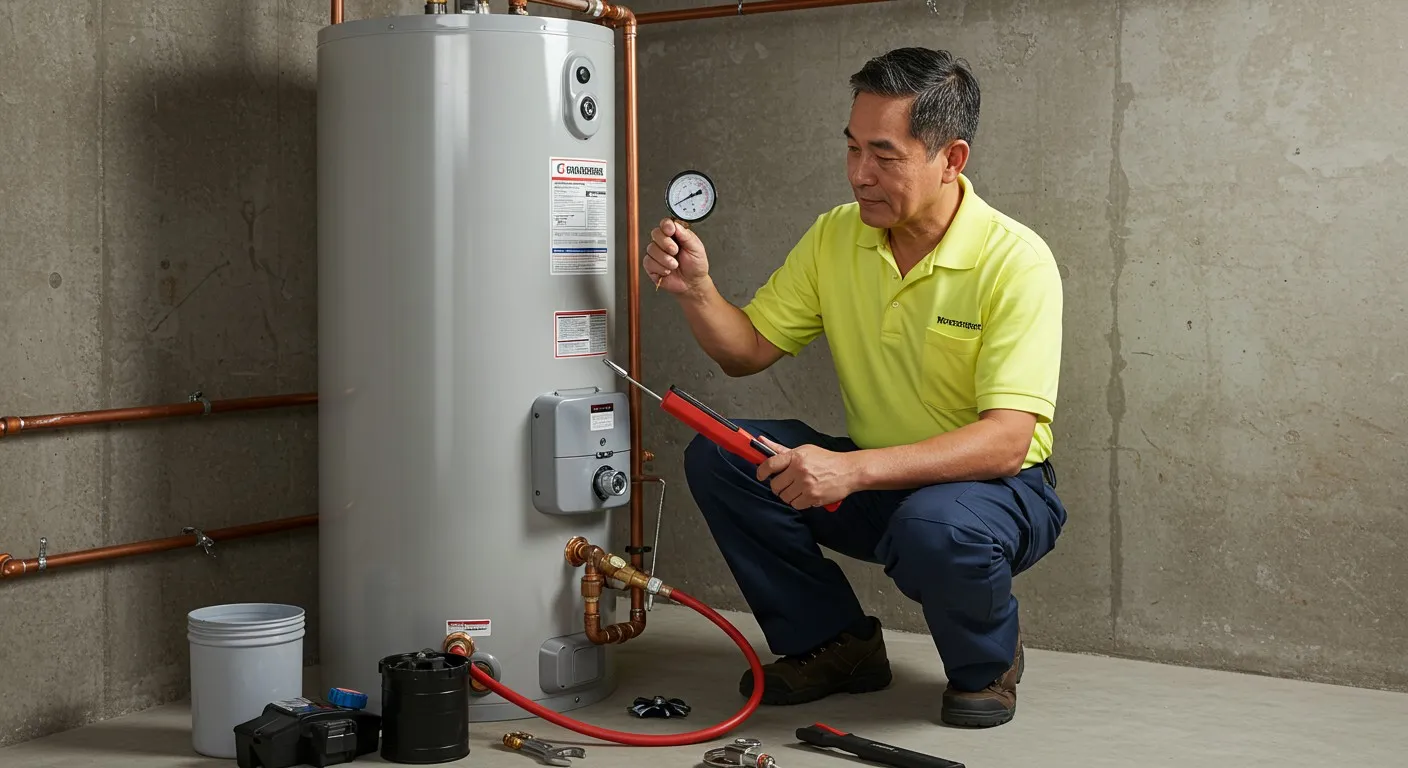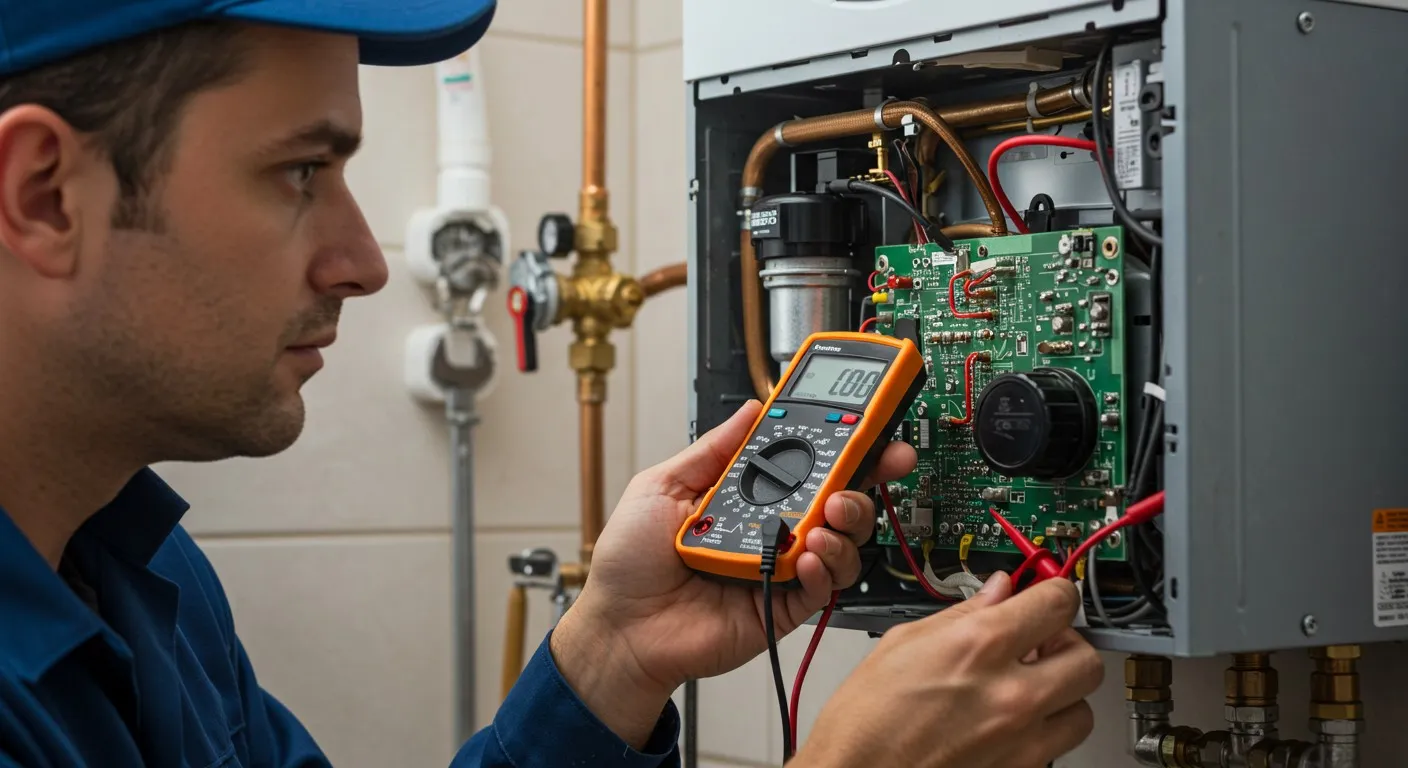Expert Water Heater Tune Up Service in Castle Hills, TX
For homeowners in Castle Hills, TX, ensuring your water heater operates efficiently and reliably is essential for daily comfort. A well-maintained water heater provides consistent hot water when you need it and helps keep energy costs predictable. While many focus on reactive repairs when a unit fails, proactive maintenance through a professional tune-up is a smart investment that can prevent unexpected breakdowns and extend the lifespan of your system. Roadrunner Plumbing & Air offers comprehensive Water Heater tune-up services specifically tailored for the needs of Castle Hills residents, helping you maintain peak performance and efficiency.
Ignoring regular maintenance can lead to decreased efficiency, inconsistent water temperatures, strange noises, and ultimately, premature system failure. Our expert technicians understand the specific challenges local water conditions might pose to your unit and provide the thorough service needed to keep it running smoothly year after year.
What Our Water Heater Tune Up Service Includes
A professional water heater tune-up is far more than just a quick look. It's a detailed inspection and servicing process designed to identify potential issues before they cause significant problems and optimize the unit's performance. Our Plumbing Services team in Castle Hills performs a comprehensive check, including:
- Full Inspection: We meticulously inspect the entire water heater system, including the tank, pipes, connections, thermostat, heating element or burner assembly, and venting (for gas units). We look for any signs of corrosion, leaks, or wear and tear.
- Tank Flushing (for tank-style units): Sediment naturally accumulates at the bottom of the tank over time. This sediment can reduce efficiency, cause noise, and even lead to premature tank failure. We perform a thorough flush to remove this buildup, restoring efficiency and potentially extending the life of your tank.
- Anode Rod Inspection/Replacement: The anode rod is a crucial component designed to corrode instead of the metal tank, protecting it from rust. We inspect the anode rod's condition and recommend replacement if it's significantly depleted, a common factor in preventing leaks and preserving tank integrity.
- Testing the Temperature and Pressure Relief (TPR) Valve: The TPR valve is a vital safety device that prevents the tank from over-pressurizing. We test this valve to ensure it's functioning correctly, a critical step for your home's safety.
- Checking Thermostat and Heating Element/Burner: We verify that the thermostat is accurately controlling the water temperature and that the heating element (electric) or burner assembly (gas) is operating efficiently. Proper temperature settings also impact safety and energy use.
- Inspecting Connections: We check all water and gas connections for leaks and ensure they are secure. Even minor leaks can escalate quickly and cause significant damage.
- Examining Venting (for gas units): Proper venting is essential for safely expelling combustion gases. We inspect the vent pipe for blockages or damage to ensure safe operation and compliance.
- Evaluating Expansion Tank (if applicable): If your system includes an expansion tank, we check its pressure and condition to ensure it is properly managing thermal expansion within the system.
This detailed process ensures every critical component of your water heater is checked and functioning as intended.

The Benefits of Regular Water Heater Maintenance
Investing in a regular water heater tune-up offers numerous advantages that contribute to your comfort, safety, and savings:
- Extended Lifespan: Like any appliance, regular maintenance helps your water heater last longer. By addressing minor issues early and preventing the buildup of damaging sediment or corrosion, you can significantly extend the operational life of your unit, delaying the need for premature Water Heater Installation.
- Improved Energy Efficiency: Sediment buildup and faulty components force your water heater to work harder, consuming more energy to heat water. A tune-up restores efficiency, meaning your unit uses less energy to provide the same amount of hot water, potentially lowering your utility bills.
- Preventing Unexpected Breakdowns: Tune-ups allow technicians to identify potential problems, like a weakening anode rod or a faulty valve, before they lead to a complete system failure. This proactive approach helps you avoid the inconvenience and expense of a sudden breakdown, especially during peak demand times.
- Ensuring Safe Operation: Safety checks, particularly of the TPR valve and gas venting (for gas units), are critical components of a tune-up. These checks ensure your unit is operating safely, protecting your household from potential hazards.
- Maintaining Consistent Hot Water: Sediment and inefficient components can lead to fluctuations in water temperature or a reduced supply of hot water. Maintenance ensures your unit can consistently meet your hot water needs.
- Peace of Mind: Knowing your water heater has been professionally inspected and serviced provides confidence in its reliability and safety.
How Often Should You Tune Up Your Water Heater?
The recommended frequency for water heater tune-ups varies depending on the type of unit, its age, the quality of your water, and manufacturer recommendations.
- Tank-Style Water Heaters: Generally, experts recommend flushing the tank annually to remove sediment. A full tune-up, including inspection of components like the anode rod and TPR valve, should typically be performed every 1-2 years. If your water has a high mineral content (hard water), more frequent flushing might be beneficial.
- Tankless Water Heaters: Tankless units require annual flushing to remove mineral scale buildup, which is crucial for maintaining efficiency and preventing damage to the heating coil. A comprehensive inspection of controls and components is also recommended annually.
Reviewing your water heater's owner's manual for specific maintenance guidelines is always a good practice. Our technicians can also provide personalized recommendations based on your unit and water conditions.
Signs Your Water Heater Needs a Tune Up
Even if you follow a regular maintenance schedule, paying attention to your water heater's performance can signal when it might be time for service. Common signs that indicate your water heater could benefit from a tune-up or inspection include:
- Unusual Noises: Popping, rumbling, or hissing sounds coming from the tank often indicate sediment buildup heating and shifting.
- Discolored Water: Rusty or cloudy water coming from the hot tap can suggest corrosion inside the tank, often a sign of a depleted anode rod.
- Inconsistent Water Temperature: If your hot water is not as hot as it used to be, or the temperature fluctuates, it could indicate issues with the heating element, burner, or thermostat, or sediment buildup.
- Reduced Hot Water Supply: If your hot water runs out faster than usual, it might be a sign of inefficiency caused by sediment or failing components.
- Minor Leaks: Any signs of moisture or small puddles around the base of the water heater should be addressed immediately, as they can escalate quickly.
If you notice any of these signs in your Castle Hills home, scheduling a tune-up is a wise step.
Serving Castle Hills and Surrounding Areas
Roadrunner Plumbing & Air is proud to serve the Castle Hills, TX community and the surrounding areas. We understand the local plumbing infrastructure and the specific needs of homes in this region. Our technicians are familiar with the types of water heaters commonly installed in Castle Hills properties and are equipped to provide efficient and reliable tune-up services. When you search for "water heater tune up Castle Hills, TX," you can trust that you're reaching a local team dedicated to providing quality service right in your neighborhood.
We service a variety of water heater types, ensuring we can meet the needs of virtually any home in Castle Hills, including:
- Conventional Storage Tank Water Heaters (Gas and Electric)
- Tankless Water Heaters (Gas and Electric)
- Heat Pump Water Heaters
Understanding Water Heater Tune Up Cost
The cost of a water heater tune-up in Castle Hills can vary depending on several factors. These include the type of water heater (tank vs. tankless), its age, the complexity of the service required (e.g., standard flush vs. heavy sediment removal or anode rod replacement), and the accessibility of the unit. Our goal is to provide transparent service, and our technicians can discuss the specific needs of your unit and the associated service before beginning work. While regular maintenance has an upfront cost, it can often save you money in the long run by reducing energy bills, preventing costly repairs, and extending the life of the appliance.
Frequently Asked Questions About Water Heater Tune-Ups
How much does a water heater tune-up cost?
The cost varies based on the type of water heater and the specific services needed. Factors like tank size, whether it's gas or electric, and the extent of sediment buildup influence the price. We aim to provide clear information regarding service costs once the technician has assessed your unit.
What exactly does a water heater tune-up include?
Our tune-up service includes a thorough inspection of the unit and its components, flushing the tank (for tank-style units) to remove sediment, checking and testing safety devices like the TPR valve, inspecting connections, and verifying the proper operation of the heating element or burner and thermostat. We also check the anode rod's condition.
How often should I get my water heater tuned up?
For tank-style heaters, annual flushing and a tune-up every 1-2 years is generally recommended. Tankless heaters should be flushed and inspected annually. However, factors like water quality and usage can influence the ideal frequency. Our technicians can provide a recommendation tailored to your situation.
Choosing regular, professional maintenance for your water heater in Castle Hills is a smart step towards ensuring consistent hot water, saving energy, and preventing unexpected issues. Our team is ready to provide the expert service your home deserves.
Financing options
flexible financing solutions

We offer convenient financing options through Wells Fargo, making it easier to invest in plumbing or HVAC upgrades with flexible payments that fit your budget. Your comfort, safety, and satisfaction are always our top priorities—every service, every time.
Apply for Financing
We offer flexible financing options through GreenSky to help you move forward with essential plumbing or HVAC upgrades without delay. With quick approvals and affordable monthly payments, you can get the service you need while staying within budget.
Apply for Financing
We offer financing through Synchrony to make it easier to get the plumbing or HVAC service you need without delay. With simple application steps and convenient monthly payments, you can manage costs while enjoying reliable home comfort.
Apply for Financing
where we serve

